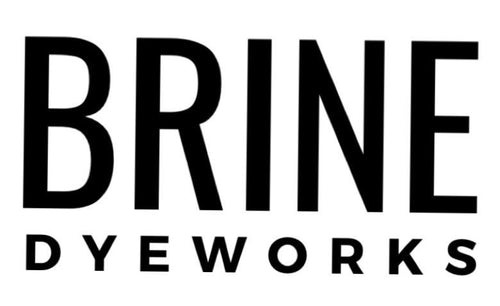Bases
Below you will find information on each of the yarn bases I offer. For more info on yarn weights (Craft Yarn Council guidelines), please click here.
Superwash Treated Yarn Bases
Eco Sock: 80% eco-processed organic Merino wool, 20% Global Standard recycled nylon; 3-Ply; 420yds/115g; fingering weight
This certified organic Merino wool base is "eco-processed", which is a non-conventional superwash treatment that does not use chlorine, employs natural salts as an oxidization agent, and uses less resources. The treated yarn is anti-felt and anti-shrink, and is IMO/GOTS certified.
Perfect for socks, shawls, light sweaters, and summer tops. This base dyes up vibrantly with crisp speckles. Dyes strike rapidly, and semi-solid and tonal colorways will display more variation in hue/tone than nylon-free and untreated bases. Recycled nylon adds strength, and eco-processing adds easy washability. As a general rule, you may notice pilling with merino fibres.
Eco processed wool is imported from Germany and spun in Canada.
Also available in 25g mini skeins (91yds), and in curated mini skein bundles and sock sets.
Untreated Yarn Bases
BFL Fingering: 100% untreated Blue Faced Leicester wool; 2-Ply; 420yds/115g; fingering weight
Blue Faced Leicester fleece has a natural butter yellow color to it, so colorways dyed on this base will have a slightly warmer undertone. BFL also has a beautiful, inherent sheen to it. Untreated (non-superwash treated) yarn dyes up with more of a "water-colour effect"; speckles are less crisp, and colorways are more blended, and slightly less vibrant. As a general rule, BFL is more resistant to pilling than Merino wool, and knits up into a fabric with more drape and strength than Merino.
Wool is imported from the U.K. and spun in Canada.
BFL Sport/DK: 100% untreated Blue Faced Leicester wool; 3-Ply; 280yds/115g; heavy sport weight/ light DK
Works up beautifully for sweaters, shawls, etc. Blue Faced Leicester fleece has a natural butter yellow color to it, so colorways dyed on this base will have a slightly warmer undertone. BFL also has a beautiful, inherent sheen to it. Untreated (non-superwash treated) yarn dyes up with more of a "water-colour effect"; speckles are less crisp, and colorways are more blended, and slightly less vibrant. As a general rule, BFL is more resistant to pilling than Merino wool, and knits up into a fabric with more drape and strength than Merino.
Wool is imported from the U.K. and spun in Canada.
BFL Worsted: 100% untreated Blue Faced Leicester wool; 4-Ply; 210yds/115g; worsted weight
Blue Faced Leicester fleece has a natural butter yellow color to it, so colorways dyed on this base will have a slightly warmer undertone. BFL also has a beautiful, inherent sheen to it. Untreated (non-superwash treated) yarn dyes up with more of a "water-colour effect"; speckles are less crisp, and colorways are more blended, and slightly less vibrant. As a general rule, BFL is more resistant to pilling than Merino wool, and knits up into a fabric with more drape and strength than Merino.
Wool is imported from the U.K. and spun in Canada.
Mohair/Silk Lace: 70% Kid Mohair, 30% Silk; 1 ply; 476yds/50g; lace weight
This yarn is known for its gorgeous halo. Colorways dyed on this base are drastically different than on other bases. Due to the halo of the yarn, colorways tend to be very blended, and can sometimes appear less vibrant, though dyes strike with exceptional vibrancy on silk fibres. This is a great yarn to hold double with others while working up. This yarn can feel irritating to those with fibre sensitivities.
Mohair and silk are imported from South Africa and Italy (respectively), and spun in Canada.
Canadian Yarns
These bases are from Frostad Farms, which is located here in Alberta, about 4 ½ hours drive north from me (yes, Canadians measure distance between locations in time, haha). The yarn is spun at a local mill, Custom Woolen Mills, and is a woolen spun yarn. Finn fleece is soft and lofty, with an inherent sheen. It has a long staple length, which also gives it a bit of strength. You will find small bits of vegetation in the yarn; I think this adds a wonderful rustic quality to the yarn. You may also have a knot in your skein. This is how it comes from the mill, and is considered normal.
Listed yardage is a guideline for determining yarn weight, but because these yarns are woolen spun, you may find you can knit at a significantly smaller gauge than with "worsted spun" yarns of the same weight, and that your finished fabric behaves differently than worsted spun yarns. Swatching will help you figure out what gauge you like best!
These Finn yarns are seasonal and are subject to availability.
Finn DK/Worsted: 100% untreated Finn wool; sourced from Frostad Farms (Sangudo, AB); woolen spun 2-Ply yarn; approximately 198m (216 yds) per 112g (4oz)
Finn Bulky: 100% untreated Finn wool; sourced from Frostad Farms, AB; woolen soft spun 3-ply (has the appearance of a single ply); approximately 112g/ 137m (4 oz/ 149 yds)); bulky weight; (formerly called "Frostad Bulky").
